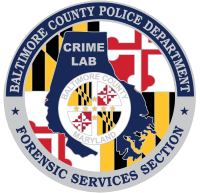Forensic Services
The Baltimore County Police Department’s Forensic Services Section (FSS) is responsible for:

- Providing quality scientific and technical support in criminal investigations.
- Gathering, preserving and analyzing evidence that can be used to solve crimes, and support criminal litigation efforts
- Ensuring the highest level of accuracy, integrity and professionalism in every investigation
The FSS is overseen by Director Kerri-Ann C.W. Lawrence M.F.S. Learn more about the Director in our video. The FSS team represents a diverse range of specialties. This diversity strengthens our unit, allowing us to approach every case with a comprehensive and collaborative perspective.
The Biology Unit receives over 400 requests per year for analysis of a variety of crimes. The analysts screen evidence for the presence of bodily fluids and conduct DNA analysis on probative samples. Watch the video to learn more.
Biologists compare DNA profiles developed from local crime scene evidence to convicted offenders, arrestees and other crime scene evidence profiles all across the country.
The Chemistry Unit is licensed by the state of Maryland and registered with the U.S. Drug Enforcement Administration, in addition to abiding by the additional requirements of these entities regarding procurement, transfer, possession, storage, use and disposal of controlled dangerous substances (CDS). Watch the video to learn more.
Chemists analyze evidence submitted by investigators for the presence of CDS by using a variety of techniques, including:
-
Microscopy
-
Gas Chromatograph/Mass Spectrometry (GC/MS)
-
Fourier Transform Infrared Spectroscopy (FTIR)
Technicians with the Crime Scene Unit respond to crime scenes to collect and document physical evidence. This can include:
-
Photographing the scene, collecting trace evidence, and preserving items such as fingerprints, biological material or firearms
-
Using specialized equipment to document scenes
-
Ensuring that evidence is handled according to strict protocols, preserving its integrity for analysis and use in court
-
Process items of evidence for latent prints using chemical and powder techniques. Latent prints developed and recovered as evidence are submitted to the Latent Print Unit for examination.
Watch the video to learn more.
Computer Forensic Examiners with the Digital and Multimedia Evidence Unit analyze electronics including computers, mobile devices and other digital media for digital evidence.
Forensic Photographers maintain photographs taken by Forensic Services Technicians and detectives, and assist the Department in personnel and other media-related photographic services.
Watch the video to learn more.
The Firearms Unit is an established Integrated Ballistics Identification System (IBIS) Site recognized by the U.S. Bureau of Alcohol, Tobacco, Firearms and Explosives (ATF). This recognition authorizes the Unit to access the National Integrated Ballistic Information Network (NIBIN) database. Access to this database enables Baltimore County to compare evidence submitted for image capture from local crime scenes to other crimes or firearms in the NIBIN database. The Firearms Unit consists of:
- A Supervisor
- Four Forensic Scientists/Firearms Examiners
- A part-time Firearms Examiner
Duties
-
Perform examinations and comparisons of microscopic markings on fired bullets and cartridge casings
-
Render firearms safe
-
Conduct scientific field investigations of shooting scenes
-
Perform serial number restorations
Watch the video to learn more.
The Friction Ridge Unit consists of the Evidence Processing Unit and Latent Print Unit.
Evidence Processing Unit
The Evidence Processing Unit consists of two analysts that:
- Process requests for laboratory examinations from the field, including:
- Latent print processing of evidence for latent prints using chemical and powder techniques. Latent prints developed and recovered as evidence are submitted to the Latent Print Unit for examination.
- Footwear examinations and database searches
- Provide training for the Forensic Services Technicians
Watch the video to learn more.
Latent Print Unit
The Latent Print Unit consists of a Supervisor, four Forensic Scientists/Latent Print Examiners, and two part-time Latent Print Examiners that:
- Analyze latent prints recovered from crime scenes/items of evidence using the method of Analysis, Comparison, Evaluation and Verification (ACE-V)
- Use a computer documentation system which tracks the process from start to finish
- Complete comparisons and verifications for potential identifications
Once an examiner determines that a print is of value, they can use the Maryland Automated Fingerprint Identification System (MAFIS) and Federal Automated Fingerprint Identification System known as the Next Generation Identification (NGI). These databases give Baltimore County access to the entire state of Maryland’s fingerprint records and records for the entire country, respectively.
Watch the video to learn more.
Accreditation
The FSS adheres to high quality standards, which includes obtaining accreditation from ANSI National Accreditation Board (ANAB). Accreditation serves as an external validation that the section’s practices, protocols, and lab operations meet quality and ethical standards. Accredited forensic sections must follow strict quality standards, such as ISO/IEC17025:2017. Accredited forensic labs must undergo regular audits and assessments to ensure continuous compliance. The accreditation of the FSS reflects the

Department’s commitment to excellence and integrity in the field of forensic science. In addition to being accredited, the FSS is also regulated by the State of Maryland under the Code of Maryland Regulations (COMAR). The Biology Unit also complies with the FBI Quality Assurance Standards for Forensic DNA Testing Laboratories, allowing the Unit to participate in the FBI’s Combined DNA Index System (CODIS). CODIS is used to store and compare DNA profiles from crime-scene evidence, arrestees and convicted offenders.
Forensic Fridays on Social Media
Get an exclusive look behind the scenes and stay up-to-date with everything happening within the FSS, every Friday on BCoPD's social media accounts.
Tour The FSS
Tours for professors, teachers and students are available on a quarterly basis. Dates for 2025 are pending.
Apply for an FSS Position
Watch the below video to learn about the open positions in the Forensics Lab and apply online.